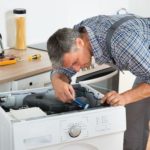![]()

Today, life bowls on at a dizzying speed. It doesn’t give us the time, the peace of mind, or even the inclination to repair appliances that have broken down.
Instead, we open a window on our phone while also doing twenty or so other things. We hit order and get in a whole new appliance. Even if it is a small cog that’s just covered with rust and demands oiling, we tend to gravitate towards a new machine.
But consider this, sure you can replace a faulty phone. But will you really throw out the French press that your mom gifted you at your wedding? How about your car? Do you instantly order a new vehicle when your old, but trusty Sedan demands an oil change? Doesn’t seem too practical, does this habit of ours?
We realized that some things need servicing, and your household appliances are the easiest to start practicing on.
You might forget that they need a little TLC from time to time. But don’t forget that with a bit of work, you’d likely bring them back to their optimal working conditions. And many businesses sell spare parts that you can go shopping at!
But Wait! Don’t Rush Out the Door – or Your Seat to Pick Up Your Phone – Just Yet. Go Through These Four Things You Should Know When Buying the Parts for Your Appliances First:
1. Determine Which Part of Your Appliance Needs a Pick-Me-Up First
Before you go hunting for Appliance Parts Near Me, begin by troubleshooting. Diagnosing the problem by skimming through the manual will tell you exactly which parts to get.
Keep in mind that you can lower the cost of repair if you purchase the parts yourself. Repair professionals might tack on a few additional costs to their bills.
Here’s an example. Say, your refrigerator starts producing warm air instead of cooling things down. A review of the manual might indicate that the overworked appliance is in dire need of new condenser coils. If the manual fails to guide you in the direction of the right parts, a store selling spare parts should!
2. Consider the Aging Factor
The National Association of Realtors’ website, HouseLogic, recommends applying the 50 percent rule to decide that.
How old your appliance is and what the repair cost would be are both crucial factors in making this decision.
There wouldn’t be any sense in spending enough on an appliance that has more than half lived its expected life span. Would there?
But how do you determine how old is too old for a specific appliance?
Does it work in the same way for all machines?
No, it doesn’t! For instance, compactors get to the half-life line after 6 years of use. And you can check for other common appliances from the list we mention below.
- Washers 10
- Dishwashers 9
- Refrigerators 13
- Disposals 12
- Range hoods 14
- Dryers 13
- Microwaves 9
- Electric ranges 13
- Gas ranges 15
- Exhaust fans 10
- Freezers 11
Besides the factor of how well a machine is maintained, there’s also the user type to consider.
A single person will be less hard on their appliances than a family would! The former will likely have fewer clothes to wash and several batches put to spin.
So, if a doddering appliance is on its last legs, you may want to chuck it out!
3. Search for Trustworthy Appliance Replacement Part Sellers
Now, look up the companies and sellers who provide the kind of parts that you do need. Make a list of them – if there are more than a few. And shortlist your choices by checking out their reputation:
- Do they supply great quality replacement appliance parts?
- Do the manufacturers of your appliance certify them?
- Did their erstwhile clients have good things to say about the sellers?
- Will they be offering a warranty with the parts?
Even if your chosen seller isn’t manufacturer-approved, they may still win based on the other qualities we mentioned above.
4. Go Hunting for Appliance Repair Contractors
This might not always be the case. At times, the repairs are minimal, and you can attempt them yourself. But for the situations where you cannot affect such an undertaking, consider hiring a professional.
Your internet search for local appliance repair contractors should bear fruits in most instances. Clarify that you already purchased the part for the appliance. If the contractor needs to fit it in, they should give you a significantly reduced estimate.
According to the appliance repair calculators here, you should expect something between $50 and $500. With the part in hand, you could be seriously reducing that price!
Remember, just as the appliance’s parts play an integral role in its proper functioning, skilled repairing hands are equally important. So, choose a professional who is…well, professional.
In conclusion, these were the four things you should know when buying the parts for your appliances.
- How to Support Your eCommerce Efforts With Email Marketing - February 5, 2020
- Here Are the 4 Things You Should Know When Buying the Parts for Your Appliances - January 17, 2020








































